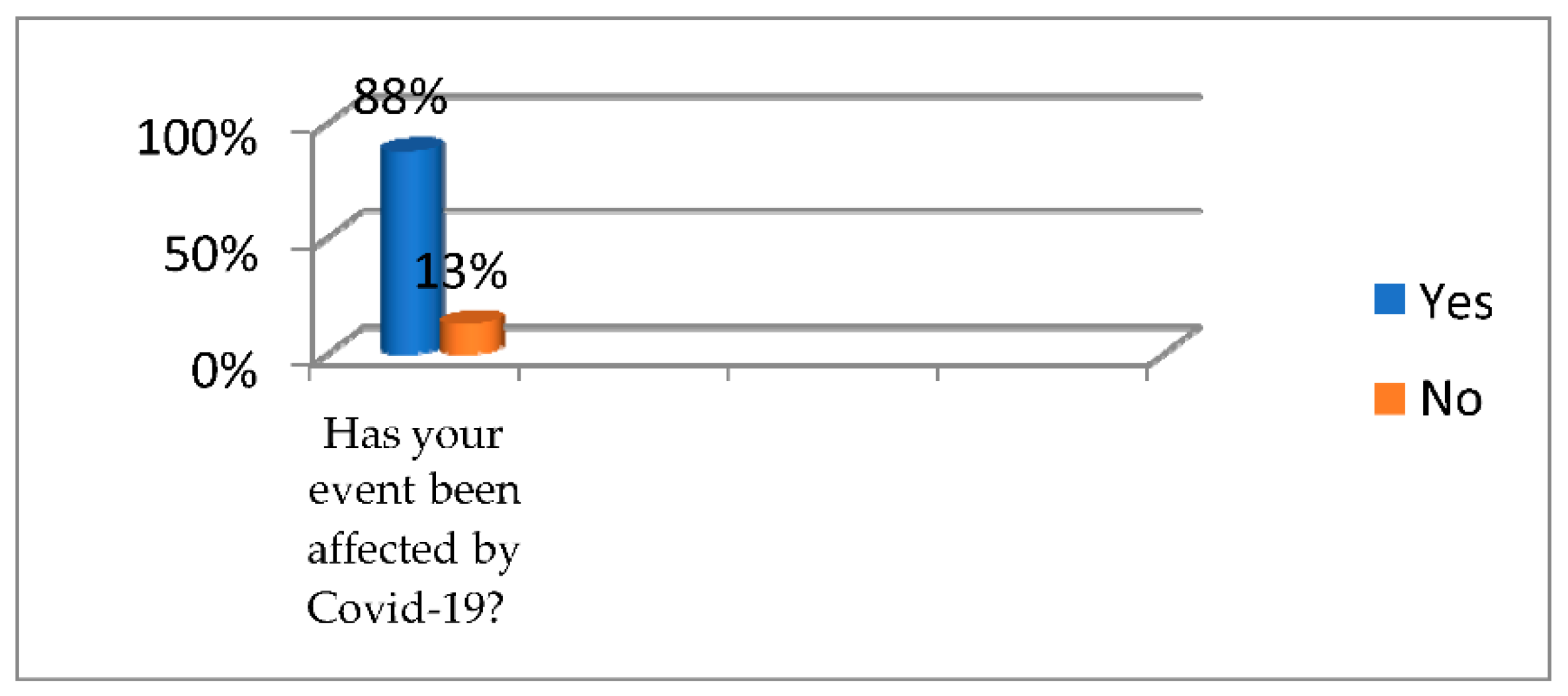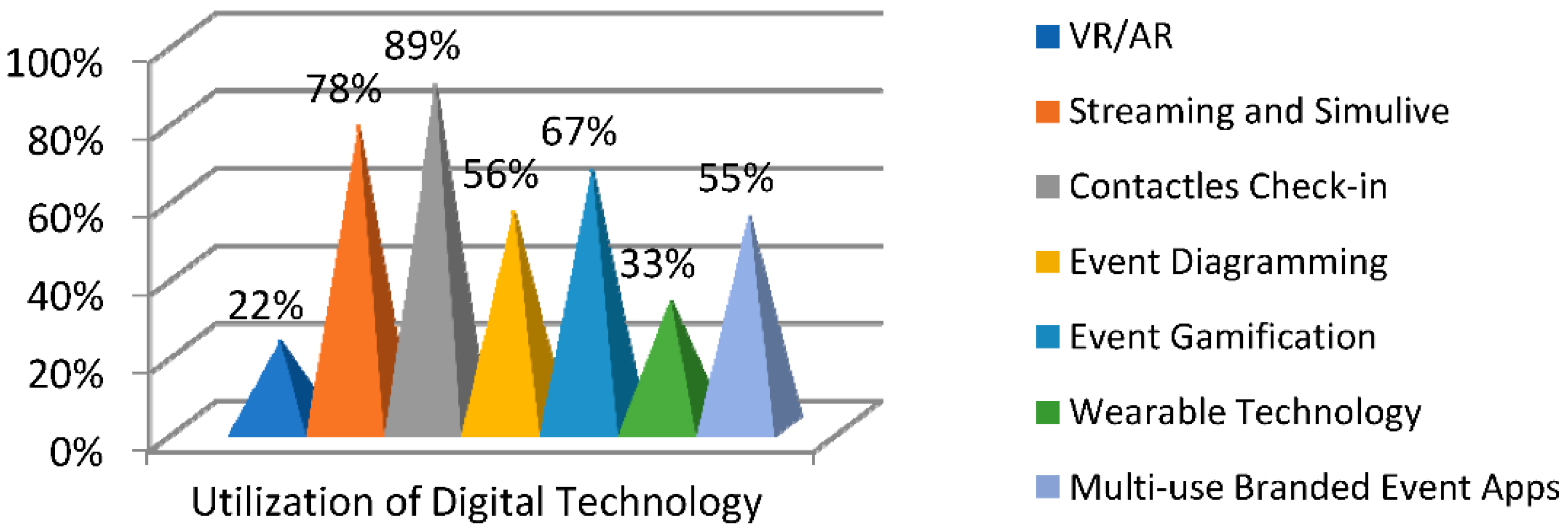Hybrid Event: Utilization of Digital Technology in Organizing Events during the COVID-19 Pandemic in Indonesia †
Abstract
1. Introduction
2. Materials and Methods
2.1. Hybrid Event
2.2. Digital Transformation in Event
- Complete Business Processes In the Cloud
- Leverage Hybrid Event Technology
- Use Event Digitalization for Data Collection and Insights
- Showcase Human-Centered Digital Tech Tools
- Personalize the End-to-End Experience
- Virtual reality (VR) and augmented reality (AR). Trends in event technology with virtual reality (VR) and augmented reality (AR) are having a major impact on events, taking engagement to the next level and connecting live and remote experiences like never before. Event planners can integrate her onsite VR headset to bring attendees off-screen and engage them in presentations using 360-degree video and interactive data visualizations. Digital attendees can also participate in a hands-on experience, making everyone feel like they are together. Same room, vendors, and exhibitors are increasingly using VR to differentiate themselves from the competition with an immersive booth experience. Attendees can drop in, put on a headset, and dive into the virtual world.
- Streaming and simulating. Participants have come to expect the highest quality streams, especially when tuning remotely. Explore comprehensive solutions that let you easily switch between virtual and hybrid events, sync multiple locations with live viewers, seamlessly combine live and recorded video, and integrate your favorite streaming services. Simulates, on the other hand, offers another streaming solution that is perfect for hybrid events. Event content can be pre-recorded and scheduled to go live at a specific time. Simulating greatly reduces the risk of synchronizing multiple videos in real-time during a live event.
- Contactless check-in. One solution is to use contactless check-in software. This is much easier to implement than you might think. An event technology provider will provide a check-in machine, and attendees simply scan their QR codes with their phones upon arrival. The software will send the participant’s badge to a nearby printer for easy badge retrieval. Contactless check-in not only improves safety and health measures, but it is also much easier and faster than traditional check-in procedures. You can finally say goodbye to long lines and bottlenecks.
- Event charts and digital floor plans. Event organizers are increasingly turning to event diagramming software to create true-to-scale 3D representations of their event spaces. Features such as drag-and-drop functionality, 3D walkthroughs, seat, and stage design, and booth and vendor mapping save time in event preparation and provide event organizers with the ability to promote their event to potential sponsors. Powerful tools are available. Event organizers can use the event app with digital floor plans to quickly create interactive maps for personal and hybrid event experiences. Attendees can click a breakout room in the event app to instantly view speaker profiles and full session topics or tap a sponsor’s logo to automatically view their stands on the exhibit hall map.
- Gamification of events. Gamification presents a great opportunity to introduce friendly competition into the event mix to enhance engagement efforts and increase fun. Leading event management platforms often include customizable replay features, allowing event organizers to answer trivia questions at the end of a session, visit exhibitor booths, and more. Attendees enter the appropriate code into the event app to earn points. Promote your leaders regularly and offer irresistible prizes.
- Wearable technology. Most event management platforms provide some level of event data and metrics, but modern wearable event technology goes one step further, tracking core event data without impacting the attendee or exhibitor experience. Wearable technologies, usually in the form of wristbands or “smart” badges, covertly track various event metrics, including: Exhibitor Hall and Visitor Traffic. Organizers use this technology to monitor staffing levels and make rapid changes in real-time to address bottlenecks. Organizers can also determine when keynote speakers and prominent guests will arrive, grant entry or access to VIP areas, monitor social distancing, and ensure that attendees will arrive safely. It is also useful for measuring the time spent participating.
- Multi-purpose brand event app. Mobile apps have long been a popular event technology solution for events of all kinds, and for good reason. Event planners can easily present agendas, speaker information, links to live streams, venue maps, event sponsors, and more from a lightweight, mobile-friendly application. The best event apps are white-label and fully customizable, allowing you to upload your brand colors, logos, and icons to create a professional and uniquely branded event application. Attendees can network and connect with others, as well as speakers and sponsors, using app features such as chat, polls, and session Q&A.
2.3. Methods
3. Results
4. Conclusions
Funding
Institutional Review Board Statement
Informed Consent Statement
Data Availability Statement
Conflicts of Interest
References
- Kresna, A.; Ahyar, J. Pengaruh Physical Distanding dan Social Distancing terhadap Kesehatan dalam Pendekatan Linguistik. J. Syntax. Transform. 2020, 1, 14–15. [Google Scholar] [CrossRef]
- Diperpanjang Lagi, Berikut Perjalanan PSBB di Jakarta. kompas.com. 7 December 2020. Available online: https://www.kompas.com/tren/read/2020/12/07/190200765/diperpanjang-lagiberikut-perjalanan-psbb-di-jakarta?page=all (accessed on 26 August 2022).
- Jokowi Umumkan Dua orang di Indonesia Positif Corona. 2020. Available online: https://nasional.kompas.com/read/2020/03/02/11265921/breaking-news-jokowi-umumkan-dua-orang-di-indonesia-positif-corona (accessed on 26 August 2022).
- Pemberlakuan PSBB di Jakarta dan Kota Penyangganya. 2020. Available online: https://balitbangsdm.kominfo.go.id/berita-pemberlakuan-psbb-di-jakarta-dan-kota-penyangganya-19-635 (accessed on 16 August 2022).
- Permatasari, D. Kebijakan COVID-19 Dari PSBB Hingga PPKM Level Empat. 2021. Available online: https://kompaspedia.kompas.id/baca/infografik/kronologi/kebijakan-covid-19-dari-psbb-hingga-ppkm-empat-level (accessed on 16 August 2022).
- IVENDO. Hasil Survei Dinamika Industri Event Indonesia di Tengah Pandemi; IVENDO: Jakarta, Indonesia, 2022. [Google Scholar]
- Miles, L.; Shipway, R. Exploring the COVID-19 pandemic as a catalyst for stimulating future research agendas for managing crisesand disaster at international sport event. Event Manag. 2012, 24, 537–552. [Google Scholar] [CrossRef]
- Herman. Pandemi COVID-19, Potensi Kerugian Sektor MICE Hingga Rp 6.94 Triliun. 2020. Available online: https://www.beritasatu.com/ekonomi/640233/pandemi-covid19-potensi-kerugian-sektor-mice-hingga-rp-694-triliun (accessed on 16 August 2022).
- Iyung. Pandemi COVID-19, Potensi Kerugian Sektor MICE hingga Rp. 6.94 Triliun; Beritasatu.com: Jakarta, Indonesia, 2020. [Google Scholar]
- Wicaksono, A. Industri MICE dapat Beradaptasi Pada Periode New Normal dengan Memadukan Kegiatan Secara Online Offline. 2020. Available online: https://www.cnnindonesia.com/ekonomi/20200603142446-92-509481/industri-mice-jadi-prioritas-kemenparekraf-saat-new-normal (accessed on 10 September 2022).
- Firmansyahrani, S.; Younna, S.; Vanessa, V.; Noor, A. Conference Hybrid Event as a New Alternative Event in the COVID-19 Pandemic. J. Bus. Hosp. Tour. 2022, 8, 301–310. [Google Scholar]
- Fryatt, J.; Garriga, R.; Janssen, R.; John, R.; Smith, S.J. How-to Guide: Hybrid Meetings; Meeting Professionals International: Dallas, TX, USA, 2012. [Google Scholar]
- Simons, I. Events and online interaction: The construction of hybrid event communities. Leis. Stud. 2019, 38, 145–159. [Google Scholar] [CrossRef]
- Fryatt, J.; Garriga, R.; Janssen, R.; John, R.; Smith, S.J. How-to Guide: The Strategic Value of Virtual Meetings and Events; Meeting Professionals International: Dallas, TX, USA, 2012. [Google Scholar]
- Linthicum. Hybrid Event in 2021: What you need to know. 2021. Available online: https://www.cven.com/en/events/hybrid-events-what-you-need-to-know#steptwo (accessed on 16 September 2022).
- McKinsey & Company. How COVID-19 Has Pushed Companies over the Technology Tipping Point—And Transformed Busi-Forever; [online]; McKinsey & Company: New York, NY, USA, 2020; Available online: https://www.mckinsey.com/business-functions/strategy-and-corporate-finance/our-insights/how-covid-19-has-pushed-companies-over-the-technology-tipping-point-and-transformed-business-forever (accessed on 26 September 2022).
- Vulture. All the Live Events, Movie Releases, and Productions Affected by the Coronavirus. Available online: https://www.vulture.com/2021/01/events-cancelled-coronavirus.html (accessed on 10 September 2022).
- Creswell, J.W.; Poth, C.N. Qualitative Inquiry and Research Design Choosing among Five Approaches, 4th ed.; SAGE Publications, Inc.: Thousand Oaks, CA, USA, 2018. [Google Scholar]
- Physical, Virtual or Hybrid—Event Digitalization and Taking It to the Next Level. 2022. Available online: https://www.marketing-interactive.com/physical-virtual-or-hybrid-event-digitalization-and-take-it-to-the-next-level (accessed on 26 September 2022).
- Jones, M. 5 Essentials and Practical Digital Transformation Consideration for the Events Industry in 2022 and Beyond. 2022. Available online: https://www.coxblue.com/5-digital-transformation-considerations-for-the-events-industry/ (accessed on 26 September 2022).
- Ether, Nolan. 7 event technology trends & what they mean for event planning professionals. 2022. Available online: https://socio.events/blog/latest-event-technology-trends (accessed on 11 September 2022).
- Flick, U. An Introduction to Qualitative Research, 6th ed.; Sage: Thousand Oaks, CA, USA, 2018. [Google Scholar]
- Bell, E.; Bryman, A. Business Research Methods, 3rd ed.; Oxford University Press Inc.: New York, NY, USA, 2011. [Google Scholar]
- Libakova, N.; Sertakova, E. The Method of Expert Interview as an Effective Research Procedure of Studying the Indigenous Peoples of the North. J. Sib. Fed. Univ. 2015, 8, 114–129. [Google Scholar] [CrossRef]



Disclaimer/Publisher’s Note: The statements, opinions and data contained in all publications are solely those of the individual author(s) and contributor(s) and not of MDPI and/or the editor(s). MDPI and/or the editor(s) disclaim responsibility for any injury to people or property resulting from any ideas, methods, instructions or products referred to in the content. |
© 2023 by the author. Licensee MDPI, Basel, Switzerland. This article is an open access article distributed under the terms and conditions of the Creative Commons Attribution (CC BY) license (https://creativecommons.org/licenses/by/4.0/).
Share and Cite
Mahadewi. Hybrid Event: Utilization of Digital Technology in Organizing Events during the COVID-19 Pandemic in Indonesia. Proceedings 2022, 83, 53. https://doi.org/10.3390/proceedings2022083053
Mahadewi. Hybrid Event: Utilization of Digital Technology in Organizing Events during the COVID-19 Pandemic in Indonesia. Proceedings. 2022; 83(1):53. https://doi.org/10.3390/proceedings2022083053
Chicago/Turabian StyleMahadewi. 2022. "Hybrid Event: Utilization of Digital Technology in Organizing Events during the COVID-19 Pandemic in Indonesia" Proceedings 83, no. 1: 53. https://doi.org/10.3390/proceedings2022083053
APA StyleMahadewi. (2022). Hybrid Event: Utilization of Digital Technology in Organizing Events during the COVID-19 Pandemic in Indonesia. Proceedings, 83(1), 53. https://doi.org/10.3390/proceedings2022083053




